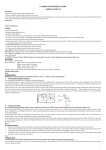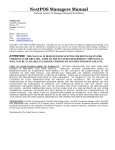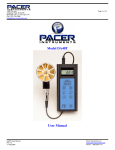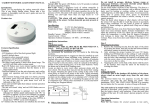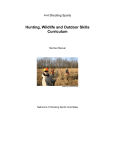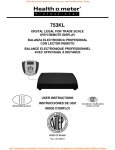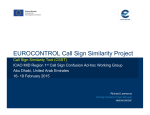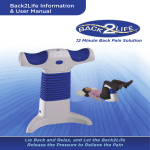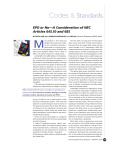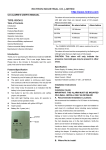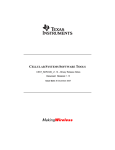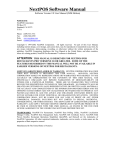Download for your safety read this now failure to read this pamphlet and follow
Transcript
FOR YOUR SAFETY READ THIS NOW FAILURE TO READ THIS PAMPHLET AND FOLLOW THESE INSTRUCTIONS COULD LEAD TO DEATH OR SERIOUS INJURY A coalition of sponsors, in cooperation with the U.S. Consumer Product Safety Commission, urges you and your family to read this safety information. This information could save your life or the lives of your family. Ignoring this information could lead to death or serious injury to you and those in or near your home. You should know: • About the danger of death or serious injury from carbon monoxide poisoning. • Vapor that cannot be seen from flammable products such as gasoline, solvents or adhesives will explode or catch fire when exposed to any flame such as the pilot light of a gas water heater or other appliances or electric sparks. • What to do if you have not had your major appliances and interior gas piping systems periodically safety inspected. • What to do around electricity or if you see an electric line fall. • That water temperatures over 125ºF can cause severe burns instantly or even death from scalds. • About the danger of explosion or fire caused by some corrugated metal gas connectors. • What to do if you smell gas or detect a gas leak. ! DANGER ! CARBON MONOXIDE Dangerous carbon monoxide (CO) gas can be produced by burning any fuel such as charcoal, gasoline, kerosene, natural gas, oil, propane gas or wood. If fuel-burning appliances are not properly installed, used and maintained, carbon monoxide can accumulate, which could lead to death or serious injury. Carbon monoxide has no color, odor or taste. You cannot see it. It is often formed whenever fuels are burned without a sufficient supply of air for complete combustion. Properly vented and operated fuel-burning appliances are safe. There are hundreds of millions of these appliances operating in the United States today. To avoid potential problems, it is recommended that, prior to the heating season, you should have an annual safety inspection of your fuel burning appliances. Also, call a qualified inspector for information on a complete heating system check-up safety inspection. See specific sections below for some additional information on locating a qualified inspector. Improper ventilation or operation of fuel burning appliances may cause carbon monoxide poisoning. Trouble can start when: - automobiles are idled in garages attached to a living space; appliances are not properly installed, maintained or used; a chimney is plugged with debris – squirrels and bird nests are often the culprits; vent pipes, heat exchangers, or flue passageways are blocked, rusted through, have spaces, gaps or leaks; too many appliances are improperly connected to one chimney; a wood stove and a furnace are vented in the same passage; excessive weather stripping, insulation and caulking prevent sufficient air circulation for proper combustion; auxiliary wood burning heaters or fireplaces are used incorrectly; or auxiliary power generators are not properly installed allowing the exhaust to enter the structure through soffit vents or other entry points; portable generators are utilized in or near the home, a garage, or any other partially enclosed space. Never use a range or oven to heat a home, and never use a charcoal grill or hibachi in the home. Only use portable generators outside and as far from the home as possible. Some symptoms of carbon monoxide poisoning are similar to those of the flu. You may feel headaches, dizziness or nausea. If you notice any of these symptoms, contact your local emergency telephone number (911) to report a carbon monoxide (CO) condition and a trained professional will respond to investigate and alleviate the hazard. If you notice any of these indications, get some fresh air immediately and seek medical help. Also, call a qualified inspector for information on a complete heating system check-up safety inspection. To avoid potential problems, it is recommended prior to the heating season, you should have an annual safety inspection of your fuel burning appliances. See below for some additional information on locating a qualified inspector. For additional safety information on CO hazards, visit the Consumer Product Safety Commission website, http://www.cpsc.gov/info/CO. -2- ! DANGER ! FLAMMABLES AND APPLIANCES ARE A MIX THAT CAN KILL Vapors from flammable liquids can explode and catch fire when exposed to a flame or electrical spark, causing death or severe burns. Studies by fire officials show that most household fires result from unsafe practices that could have been avoided. Although modern appliances have a number of safety features built in, it’s important to remember that any appliance can pose a fire hazard. Please review this list of safety precautions and follow them closely: - - Never store or use gasoline or any flammable products such as solvents, varnishes or adhesives in the same room with a gas, oil or electric appliance. Never store rags, paper or other combustibles near any gas, oil or electric appliance. Have only qualified personnel install or service your appliances. If an appliance, such as a water heater, is installed where flammable products will be stored or used, such as a garage, be sure it is a minimum of 18” above the floor unless listed as flammable vapor ignition resistant. This may reduce but not eliminate the risk. Read the user’s manual and follow the instructions carefully. Use appliances only for their intended purpose. If the manual is missing, contact your retailer or the manufacturer immediately for a replacement. Remember: Vapors from flammable products cannot be seen. They are usually heavier than air and can travel great distances. They can be carried from other rooms by air currents to the pilot and main burner flames of gas appliances. The constant pilot burner is always lit and can ignite any vapor that contacts it. ! DANGER ! IF YOUR APPLIANCE AND PIPING SYSTEMS HAVE NOT BEEN SAFETY INSPECTED For your safety and the safety of those around you, it is important to have major electric or fuel-burning appliances and equipment, such as furnaces, boilers, ranges, water heaters and clothes dryers, periodically safety inspected. Annual safety inspections are often recommended by manufacturers. This safety inspection can be performed by a qualified service agency that is experienced in performing service work and has complied with all the requirements of your state or local building or mechanical code inspection agency. If you need the name and telephone numbers of a qualified inspector, check your telephone directory or the internet under the heading “heating equipment service” or “appliance service.” You may also telephone or visit the website of your local or state consumer affairs office, or fuel supplier for information. Failure to have this equipment properly maintained could lead to property damage, personal injury or death. If you have not had an inspection performed within the last three years, you should make an appointment today for you and your family’s safety and the safety of those around you. INTERIOR GAS PIPING SYSTEMS Periodic inspection of your interior gas piping system is recommended to help ensure there are no leaks and the system is properly installed. This includes a check of the proper electrical bonding and grounding of the gas piping system. Black steel and copper gas piping systems are considered properly bonded if -3- there is a gas appliance that requires electricity to function (e.g. furnace) and that appliance has a grounding conductor connection. Yellow coated Corrugated Stainless Steel Tubing or CSST requires “direct bonding” to minimize the potential of damage to the CSST in the event of lightning strikes at or near your structure or home. The direct bonding of yellow CSST systems require a separate copper or similar conductive wire be installed that connects the CSST to the electrical grounding system. If you are unsure as to whether the gas piping is properly bonded, contact your builder; electrical contractor, or a licensed, qualified professional home inspector for an evaluation of your home. CONTACT WITH ELECTRICITY CAN CAUSE LOSS OF LIFE Do not touch or go near any overhead or other electrical wires. Avoid direct and indirect contact with power lines. Always assume that the power line is “live” or energized. Immediately call the electric utility or dial the telephone emergency operator for assistance if you see a fallen electric wire. Only the local electric utility can verify that an electrical line has been powered off or de-energized. Never dig or allow others to dig on your property unless underground wires and pipes have been located by the utility as required by the “one Call Law” in your State, City or locale. Read and follow the safety warnings and directions before using any electrical appliance. SETTING YOUR WATER HEATER TEMPERATURE TOO HOT CAN CAUSE SEVERE BURNS Any thermostat setting on a water heater above 125ºF may cause severe burns or other injuries particularly to children, elderly persons or the infirm. Read the water heater instruction manual before setting temperature. ! DANGER ! CERTAIN OLDER GAS CONNECTORS MAY BE DANGEROUS Gas connectors are corrugated metal tubes used to connect gas appliances in your home to fuel gas supply pipes. Some older brass connectors have come apart, causing fires and explosions resulting in deaths and injuries. These older brass connectors have a serious flaw in how their tubing was joined to their end pieces. Over time, the end pieces can separate from their tubing, and cause a serious gas leak, explosion, or fire. To our knowledge, these dangerous uncoated brass connectors have not been made for more than 30 years, but many of them are still in use. The older these gas connectors get, the greater the possibility of failure. Although not all uncoated connectors have this flaw, it is very difficult to tell which ones do. Therefore, any uncoated brass connector should be replaced immediately with either a new plastic-coated brass or a new stainless steel connector. Connectors can wear out from too much moving, bending or corrosion. Connectors should always be replaced whenever the appliance is replaced or removed from its location. !! WARNING: Only a qualified professional should check your connector and replace it if needed. Don’t try to do this yourself! Moving the appliance, even slightly, whether to clean behind it or to inspect its gas connector can cause the complete failure of those older weakened connectors, possibly resulting in a deadly fire or explosion. -4- Do not move your appliance to check the connector! IF YOU SMELL GAS IF YOU SMELL GAS OR SUSPECT A GAS LEAK: - - * Leave the house immediately. Don’t use your phone or cell phone; call the local utility from outside the dwelling or ask a neighbor to notify the utility call center operator for assistance from the adjacent home. Don’t light a match. Don’t turn on or off a light. Don’t switch on or off anything electrical. Don’t send a text. * * * * * Save this information after it has been read by placing or attaching it in a visible location near major appliances. For additional home safety information, contact the U.S. Consumer Product Safety Commission at 1-800-638-2772 or visit the CPSC website at www.cpsc.gov. Created 12/19/96 Revised 5/12/04 Revised 6/28/12 Revised 10/1/12 Revised 10/5/12 Revised 12/5/12 -5-





